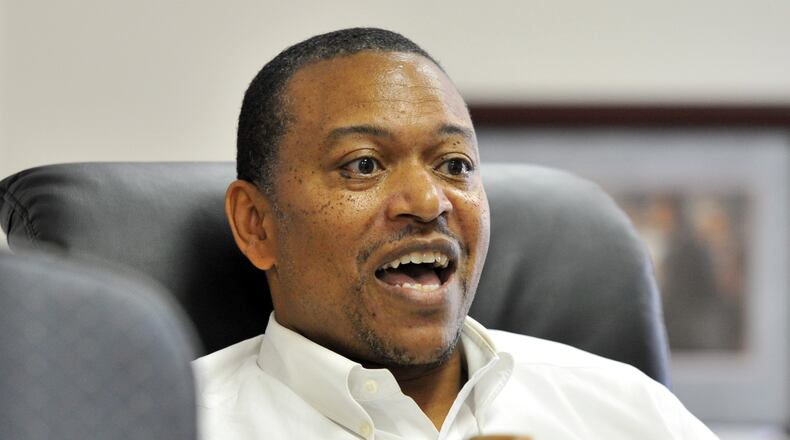The Republican Party's uphill battle with black and Hispanic voters appears even steeper now that their standard-bearer is Donald Trump, whose critics label him a racist and xenophobe. We sat down Thursday with Leo Smith, the Georgia GOP's minority engagement director, on the challenge of growing the party in the era of Trump.
Smith, in his third year in the job, outlined a new digital effort targeting black voters and his plans to raise new more money to beef up minority engagement in campaigns, much like the "B.L.U.E. Institute" launched by Georgia Democrats.
He also predicted that, with the right strategy and advisers, Trump could get one-fifth of the black vote – shattering recent high-water marks. And he didn’t rule out his own run for higher office or a bid to take over the state Republican Party next year.
Smith's prediction got a side-eye from Kendra Cotton, the political director for Georgia's Democratic Party. She said minority outreach efforts by the Georgia GOP "masquerade as progress" and that it's "going to take more than just lip service, smiles and handshakes to convince marginalized Georgians to vote against their own interests."
Here’s a few snippets of our interview with Smith:
On how to balance Republican misgivings with Trump, especially among minority voters:
“Donald Trump doesn’t stop me from minority engagement, from shaping and transforming the structure of the Georgia Republican Party so we’re more financially solvent. He doesn’t stop me from messaging, from strategically creating partnerships with independent expenditure groups. … When we lose sight of that and blame one person, that’s scapegoat-ism. And I’m not going to use him as a scapegoat to absolve my responsibility.
“A lot of the traditional base of supporters are accustomed to winning all the time. They’re used to people jumping on the bandwagon. In a way, the disruption that’s happening does not make the black Republican or Latino Republican scared. Because we’re used to disruption. I’m finding some of my strongest and most stalwart warriors right now are black Americans. We’re underestimating the type of support Donald Trump can get in the race. Donald Trump can easily get 20 percent of black voters.”
On how Trump can do that, when many polls show him at single digits among black voters:
“It all has to do with pushing back on accusations of racism. Donald Trump is smart enough to know that he’ll have to go out and say, ‘Have I ever made a derogatory statement about black Americans? No. I may be a nationalist but I believe your rights are a greater priority than undocumented immigrants.’ If he says that directly, and he lays out an education agenda and an economic agenda, they may say it’s about time someone is looking out for our interests.
“A lot depends on the professional capacity of consultants on the Republican side to advise him. I’ve been able to sneak into some Democratic meetings because of my skin color, and I see legislators directly running the grass-roots movements. Republicans always depend on local groups or party chairs. But when (House Minority Leader) Stacey Abrams or (Democratic state Sen.) Vincent Fort is leading the strategy it lends it credibility from the top. You have to get Republican candidates get involved in a hands-on way in an inclusion strategy. They need to diversify the number of people who consult with them. I’m talking about diversifying not just the candidate base, but the people who work with them.”
On his most immediate goals:
“We have a long-term goal and that’s party stability. Our party in general views that it isn’t efficient to support voter education drives. And as we mature, I think it will be viewed as a must for us. How can we know what makes American exceptional unless we educate people about the facts?”
“I have a meeting soon with 10 investors who want to shore up minority engagement in Georgia for the long term. If we can create a strong best-practices in Georgia, we can create a template for the whole nation. My goal is to keep Georgia red and create a systemic template for minority engagement that’s effective, affordable and aspirational. It will be something that builds team morale for the entire party.”
On whether the specter of Trump will complicate the outreach:
“Well, you don’t. People are looking at an icon within the party. But I’ll look at people and say, ‘I believe in you as much as I believe in Donald Trump.’ … We’ve got to be more deliberate and patient about long-term objectives to transform and reignite the American spirit.
“I believe that black Americans and Latinos will save the Republican Party. It just may look different when we come out. It will be conservative, pro-Second Amendment, pro-free markets. It will be all those things, but it will talk about them differently. And there will be more inclusion.”
About the Author
The Latest
Featured




